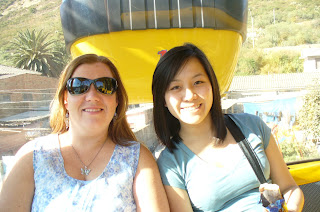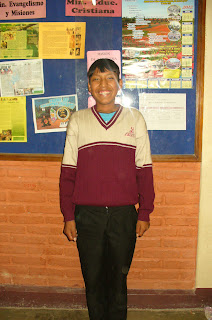So today, I had an orientation session on culture shock. Apparently, there are a couple of phases for the average foreigner:
1. Fascination
2. Hostility and aggression
3. Partial acceptance
4. Full immersion into the culture
When I heard about that, I knew immediately which stage that I was in. Armed with my trusty camera, every other word coming out of my mouth being either "How do you say this in Spanish?" or "The weather/this building/this tree/this piece of rock is SO nice!", I admit that I am one hundred percent in phase 1. Hopefully I can glide straight through phase 2, but my orientation leader, Amalia, assures me that culture shock is inevitable. As long as I don´t start throwing my camera on the ground and start acting all crazy, I think I will be okay though.
 |
| Caramela, the princess of the house |
These past three days have been full of visiting offices, various locations, and trying new things. I am living with a long term missionary, one other short termer, and a Bolivian girl. Between the four of us, we communicate in five languages: English, Spanish, French, Quechua (okay, only one girl speaks Quechua) and Chinese (well, I don´t actually speak Chinese, but I´ll just throw that in there). Everyone is so nice and friendly, I don´t even have a free moment to think about missing home! Our house is quite large compared to the average home in Cochabamba, with a large living room, dining room, kitchen, five bedrooms and two bathrooms. Here are some pictures:
 |
| The kitchen |
 |
| The living room |
 |
| The front yard |
Acts 2:46-47 "And day by day, attending the temple together and breaking bread in their homes, they received their food with glad and generous hearts, praising God and having favour with all the people. And the Lord added to their number day by day those who were being saved."
On the first day, I visited one of my roommate´s church, for a prayer night. What really struck me was the unity between the congregation. This was a church that did not just gather on Sundays, but they were truly a family. Currently, I am in the book of Acts, and it is really amazing to see how this church takes prayer so seriously. Everyone was given a pillow, and each of the twenty people were given two or three different items to pray for. And there were a lot of things to pray for, from health needs to ministry work to the salvation of others. We are always told that God is the God of Abraham, the God of Jacob, the God of Moses, He is God everywhere, but it wasn´t until I was actually praising God in another language that it began to hit me. The sense of community here in Cochabamba is very strong.
The orientation left me feeling a little overwhelmed, but it definitely is important to understand the culture and to be able to adapt to different indigenous populations. Even little things such as how much food you leave on your plate is a big deal! For example, the way you act at the dinner table is very different between the Quechuas and the Yuquis. For the Quechuas, you need to eat all of the food on your plate, and if you leave anything, it is considered rude, but for the Yuquis, you can leave a little bit. If you eat all of it, they will assume that you want more. I always find it very interesting learning about culture, because for Bolivians, it is so natural, but for me, I have to take a course on how to even properly greet people! But the importance of understanding and acting properly in certain cultures also seen in the New Testament, where Paul says:
"To the Jews I became as a Jew, in order to win Jews. To those under the law I became as one under the law (though not being myself under the law) that I might in those under the law. To those outside the law I became as one outside the law (not being outside the law of God but under the law of Christ) that I might win those outside the law. To the weak I became weak, that I might in the weak. I have become all things to all people, that by all means I might save some. I do it all for the sake of the gospel, that I might share with them in its blessings." (1 Cor. 9:20-23).
Culture is always fascinating, but when I read this verse, it makes me think of two things:
1. Ultimately, as believers, our purpose in everything is for the sake of the gospel, and being able to adapt to a culture, language, lifestyle is all part of that.
2. Back in Canada, this verse still applies, but in different ways. I think that it will certainly be interesting coming back and realizing that these verses shouldn't be any different at home, but we should be just as motivated.
I realize that I am going to have to dedicate an entire section to the food alone. My goodness, there is so much of it! I have tried silpancho (pronounced sil-pan-cho), a lot of Western food (if you can call that 'trying), salteñas, and pollocochis (I totally made that word up, I forgot what the actual word is. It's basically just popcorn chicken). And it is all AMAZING. And the best part is that you can get a full restaurant meal for a whopping grand total of five dollars.
 |
| Silpancho on the first night! |
 |
| This quesadilla was humungous |
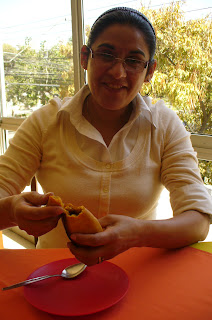 |
| Amalia (my orientation leader) eating a salteno |
Today, I went to the largest market in South America, called la Cancha, with my orientation leader. I'm glad she was there because I would have gotten so lost without her. They pretty much sold everything, from fabric to food, from souvenirs to appliances, from movies to shoes. It was pretty crazy, but really fun.
 |
| So you can watch tv while drying your clothes, of course |
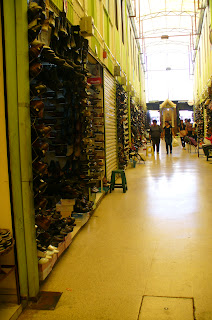 |
| There were probably two or three other shoe sections |
In Bolivia, there are many groups of indigenous people, the largest percentage being made up of Quechua people. Many of them were also selling products in the market, and it was really cool to see their traditional outfits. Most women have long braided hair, with straw hats, skirts, a blouse and a more colourful shawl made up of a fabric whose name I have forgotten. Most of the people selling were women, as the men generally work out in the field, and you can also see a lot of children with their mothers. In the Quechua culture, children usually follow their mothers to work until they are around 10-12 years old, at which point the boys go to work with their fathers. I think it is just the cutest thing how a lot of the toddlers are wearing grown up clothes (I saw this little boy reading a newspaper on a stack of fruit, it was so precious), especially the really thick sweaters. Although it is winter in Cochabamba, it is only the evenings that are cold, and during the day, I was burning up. When I start working with Elijo la Vida next week, we will occasionally go to the Amazon to work with the Yuquis, which is another indigenous population. I am so excited!
 |
| A Quechua lady selling food in a wheelbarrow |
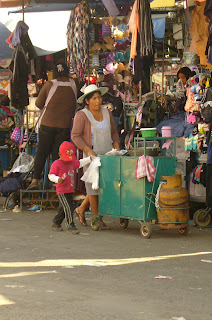 |
| Quechua woman with her son (he's wearing a cap) |
Current prayer requests:
-To continue to learn Spanish quickly, so that I will better be able to serve at Elijo la Vida
-To continue to be refreshed by His Word
-For Elijo la Vida, that God would be working through the workers and opening the hearts of the women their to learn more about Him.
Hasta luego!
Jocelyn










